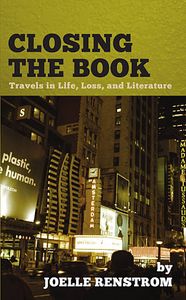Exploring Where Life Intersects Literature: Renstrom Releases Unique Collection of Nonfiction Essays
Literature, typically crafted for wide audiences, has the unique ability to touch each reader in an incredibly personal way. It’s is a powerful means to share, guide, and connect readers across all borders and boundaries through a relatable story. College of General Studies (CGS) Rhetoric instructor Joelle Renstrom explores that delicate intersection of life and literature in her newly released collection of non-fiction essays: Closing the Book: Travels in Life, Loss, and Literature.
CGS sat down to learn more:
CGS: Let’s start at the beginning. What is the inspiration behind Closing the Book: Travels in Life, Loss, and Literature?
JR: I lost my dad to cancer, and instead of being able to throw myself into my work, I found I’d lost my work, too. I was just finishing writing a novel in which the protagonist’s dad dies, and a couple months later, that became my reality. Not only was my favorite person in the world gone, but so was the one activity I’d always found solace in. I stopped working on that book— I couldn’t fictionalize what had actually happened—and I didn’t know if I could or wanted to write anymore. So I did two things, both of which saved me: I traveled and I read. And after a while, I was able to put myself back together, both as a person and as a writer. That’s when I realized I had a story to tell after all.
Did you write the essays individually, or were they written knowing that they would be parts of a collection?
The letters to Ray Bradbury came first. I always loved him as a writer and a person, and reading and teaching his books during this time brought me so much comfort and pointed me in the only direction that made sense. I wanted him to know what his writing meant to me, so I wrote one letter, then another, and ended up writing about a dozen altogether until I had an essay. I stopped there, for a while. I thought about writing a series of letters to a bunch of different authors, but I ultimately decided that was too gimmicky, that it might cheapen what I got from them. Essays, on the other hand, allowed me to pay homage to the works that guided me while having more freedom to explore the themes, so about six months after I wrote the Bradbury letters I started writing more.
The structure of the essays sounds pretty unique—each contains reflections on a life theme, framed by a certain piece of literature. Are these favorite pieces of literature, or did you seek them out for each essay?
Many of them have been my favorites for a long time, but gained new resonance for me after my dad died. Some of them took me by surprise. I’d read Camus’ The Stranger a long time ago, and I liked it, but it wasn’t an important book for me until I taught it and engaged its philosophies in light of what I was going through. When I wrote the piece about luck, I immediately thought about Vonnegut, and reread Sirens of Titans after I finished the rough draft. Arthur Clarke’s Childhood’s End had always been a favorite too, and one I reflected on a lot before I even started writing the book. I was reading and teaching these books while thinking about and living with these questions and thoughts–I didn’t have to contrive anything, which for me speaks to the power of this literature.
Can you explain a bit about your experience in writing about issues that are deeply personal, knowing they would be shared with a wide audience?
My thesis for graduate school was fiction– that’s what I always thought I would be writing. After my novel became reality, I switched to nonfiction quite quickly. I’d written a few pieces here and there, all pretty low stakes and fairly impersonal, so I really had no experience writing this kind of thing. But I think that’s part of what made it so profound for me– it was all very raw, and writing the first drafts was the only time I felt totally unafraid. I had to think about structure and narrative voice and whether the work was too confessional (I didn’t want it to read like a journal) and other writerly considerations, and by then I was committed to the content. I published some of the chapters as essays in magazines and that felt okay, but I’ll admit I’ve woken up at night in a cold sweat thinking about this book being out there. I worry that it’s too self-involved or too sentimental, and as with everything, but particularly nonfiction, I worry that people will read it and think, “who cares?” But ultimately, these fears are common among writers, and we wouldn’t do what we do if we didn’t want to get read, so I’m pretending to be brave.
That certainly takes courage, and we commend you for being brave (not just pretending). Do you have a favorite essay?
That’s a hard question! I’m proud of the imaginary interaction between Albert Camus and Kazuo Ishiguro in “How I Spent My Free Will,” and I’m attached to the final essay, “The Stars Are Not For Man,” because it’s about my move to Boston and about hope. But I’d have to go with “Letters to Ray Bradbury,” which will always have a special place in my heart.
Closing the Book may be purchased through publisher house Pelekinesis, and the trailer may be viewed on Renstrom’s website.